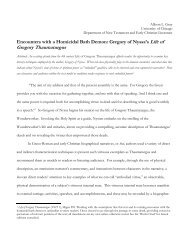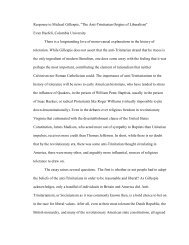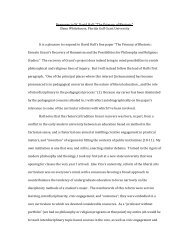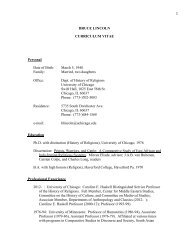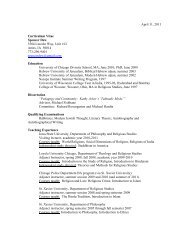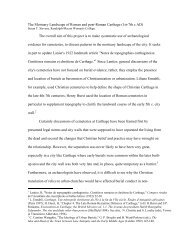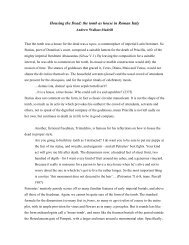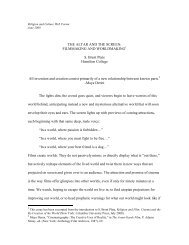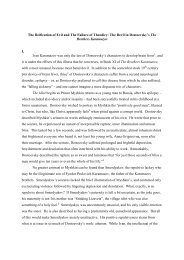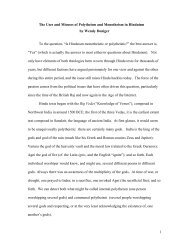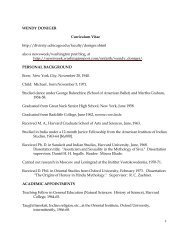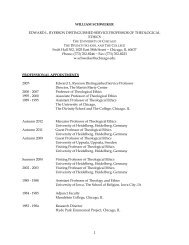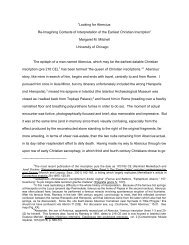*Criterion Winter 02-4.16 - Divinity School - University of Chicago
*Criterion Winter 02-4.16 - Divinity School - University of Chicago
*Criterion Winter 02-4.16 - Divinity School - University of Chicago
Create successful ePaper yourself
Turn your PDF publications into a flip-book with our unique Google optimized e-Paper software.
8 W INTER 20<strong>02</strong><br />
. . . there is a kind <strong>of</strong> cognitive state that inclines one toward certain kinds <strong>of</strong> beliefs<br />
and structures the way in which one sees the world.<br />
Moving closer to the present, certain people refused<br />
to believe the report <strong>of</strong> the Warren Commission on the<br />
Kennedy Assassination. While they may not agree with one<br />
another, such skeptics do concur that there is more to the<br />
story than meets the eye. Some <strong>of</strong> these people may also be<br />
inclined to see conspiracies in public (or private) life where<br />
others do not, and they are <strong>of</strong>ten dismissed as paranoid.<br />
Another case, this one imaginary, though plausible, I think:<br />
A university research group publishes a study that purports to<br />
show that the death penalty does not deter crime, or that<br />
gun control does. Political liberals hail the new evidence for<br />
their views; political conservatives challenge the methodology<br />
<strong>of</strong> the studies and are skeptical <strong>of</strong> their conclusions.<br />
Finally, back to theism. Some theists see God everywhere<br />
in nature and have no problem reconciling their faith with<br />
the latest science. Some claim to experience God directly, to<br />
walk with him every day or at special times <strong>of</strong> their lives.<br />
Others find arguments for the existence <strong>of</strong> God that they<br />
consider compelling, and see those who reject such arguments<br />
as rejecting the evidence <strong>of</strong> reason itself. Still others are<br />
unmoved by these experiences; even when they cannot find<br />
logical flaws in the arguments for the existence <strong>of</strong> God, they<br />
are not inclined to give them much weight.<br />
The last case, <strong>of</strong> course, is the kind with which Pascal is<br />
directly concerned: those whose hearts God has moved can<br />
see evidences for God’s existence that others cannot. But<br />
there is a way in which this kind <strong>of</strong> case is not so different<br />
from the others I have presented. Glanvill and More,<br />
convinced in the existence <strong>of</strong> spirits and demons, can see<br />
evidence for them that others will dismiss. Morin, the committed<br />
astrologer, can see patterns in the relations between<br />
the celestial and the terrestrial realms that we do not.<br />
The conspiracy theorist (or the paranoid) can see patterns<br />
in world events that the rest <strong>of</strong> us might miss. Our political<br />
commitments shape the way we receive supposedly empirical<br />
evidence about the world and evaluate supposedly<br />
scientific studies.<br />
What these cases have in common, along with many<br />
others, is the idea that there is a kind <strong>of</strong> cognitive state that<br />
inclines one toward certain kinds <strong>of</strong> beliefs and structures<br />
the way in which one sees the world. This is, I think, the<br />
kind <strong>of</strong> state that Pascal has in mind when he talks about<br />
knowledge <strong>of</strong> the heart. But, so as not to associate it too<br />
closely with the precise view that Pascal put forward, let<br />
me call it a ‘mind-set’. Mind-sets are common in everyday<br />
language, but because I would like to make it into something<br />
<strong>of</strong> a technical term, I will ask you to suspend any ordinary<br />
associations you might have with it.<br />
What can we say about these cognitive states that I would<br />
like to call mind-sets? As I have suggested, mind-sets structure<br />
the world. What does this mean? First <strong>of</strong> all, mind-sets structure<br />
experience in an important way. Because <strong>of</strong> his particular<br />
mind-set, the theist can see God in nature—in the birds, in<br />
the trees, even at the quantum level. Because <strong>of</strong> their particular<br />
mind-set, the astrologer and the conspiracy theorist<br />
can see patterns that we cannot. Because <strong>of</strong> their mind-set,<br />
Glanvill and More could see spiritual phenomena in places<br />
that others could not. But not just experience and observation<br />
are influenced by mind-sets; reason is also influenced. There<br />
are some arguments that are obviously invalid, and they cannot<br />
be rescued. But outside <strong>of</strong> this, there is a lot <strong>of</strong> room for<br />
disagreement. One might wonder if an apparently valid<br />
argument is not really false; the history <strong>of</strong> philosophy is filled<br />
with cases in which arguments that are accepted by one<br />
generation <strong>of</strong> thinkers are routinely rejected by the next.<br />
Even with arguments that are accepted as valid, there is still<br />
disagreement about how much weight should be given to<br />
them. Again, in the history <strong>of</strong> philosophy there are many<br />
cases in which two camps are separated simply by the weight<br />
they are given in different arguments. (For instance: the disagreement<br />
between empiricism and rationalism over the<br />
origin <strong>of</strong> ideas.) Mind-sets are the glasses through which people<br />
look at the world: they make certain facts and reasons more salient<br />
than others, and enable us to see some things and ignore others.<br />
Mind-sets come in a number <strong>of</strong> different varieties. In<br />
some cases, it is appropriate to think <strong>of</strong> a mind-set as a commitment<br />
to a particular proposition. For example, consider<br />
the case <strong>of</strong> a parent who refuses to admit that his child may<br />
have deceived him. Here the mind-set might be expressed<br />
propositionally as a belief that the child is, indeed, trustworthy




